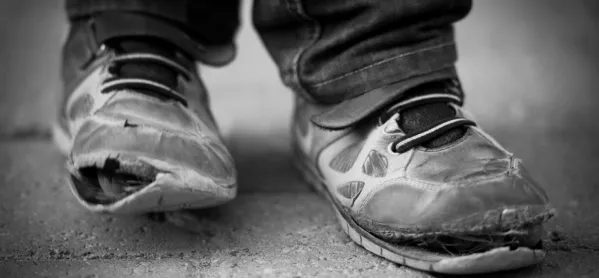- Home
- Children facing ‘Dickensian levels of poverty’
Children facing ‘Dickensian levels of poverty’

A charity has warned of “Dickensian levels of poverty” as they said 100,000 young Scottish children will miss out on Christmas basics.
The warning coincides with the suggestion from a thinktank that Scottish ministers could raise enough cash to lift 40,000 children out of poverty by freezing the point at which people start to pay higher rate income tax.
Analysis by IPPR Scotland suggested keeping the threshold for the 41p tax band at £43,430 - instead of raising it in line with inflation - could generate up to £210 million in additional revenue by 2021-22.
Headteachers, however, have already hit out at finance secretary Derek Mackay’s plans not to echo chancellor Philip Hammond’s move to increase the higher-rate tax threshold to £50,000, saying it will make promoted posts in schools less attractive.
Action for Children said a decade of austerity “has caused almost unrecognisable levels of poverty” in Scotland’s communities, and that a shocking number of children will be deprived of basics such as warm winter clothing, fresh food or celebrations this Christmas.
Scotland’s largest teaching union, the EIS, said last year that poverty was tightening its grip on “alarmingly high numbers of Scotland’s children”.
Two-thirds of respondents to a survey run by the union reported seeing an increase in the number of pupils experiencing poverty. Earlier this year, the Scottish Parliament’s education and skills committee called on the government to poverty-proof education after it heard evidence about hidden costs incurred by parents, including prohibitively expensive school uniforms.
Paul Carberry, Action for Children’s director for Scotland, revealed their frontline services have seen a 30 per cent rise in families seeking financial advice in the last three years.
The charity cited government figures suggesting 100,000 Scottish children aged 10 or below are in families with low incomes and material deprivation.
He said: “Every day, our staff see first-hand the impossible choices that families living in practically Dickensian levels of poverty have to make.
“Our services are helping thousands of families keep their heads above water through budgeting, providing a meal or making sure they get help from food banks.
“Inequalities in health and life-expectancy remain as prevalent and after a decade of Tory austerity, the dramatic rise in the use of food banks tells its own sad story.
Mr Carberry added: “While the Conservative government claims that the era of austerity is over, it is impossible to see the evidence of this.
“Their policy agenda has caused almost unrecognisable levels of poverty in communities the length and breadth of Scotland.”
A UK government spokesman said: “We want every child to have the very best chances in life. There are now one million fewer people living in absolute poverty since 2010, including 300,000 children.
“With this government’s changes, there are a near record low number of children in workless households in Scotland, boosting their prospects in life. Household incomes have never been higher, income inequality has fallen and taxes are down for families and businesses.”
Finance secretary Derek Mackay will set out his tax plans for Scotland when he delivers his Budget to Holyrood on December 12.
Rachel Statham, IPPR Scotland economic analyst said: “If tax bands go up with inflation, as usual, higher earners in Scotland - those earning over £43,430 a year - could receive a tax cut over three times larger than someone earning minimum wage.
“At a time when public finances are under considerable strain, Scotland can’t afford this. By freezing the higher rate tax threshold, the point at which earners begin to pay the 41p tax rate, we could raise additional tax revenue.
“This could be spent on the Scottish government’s clear priorities, like ending public spending cuts or investing to lift tens of thousands of children out of poverty.”
Ms Statham added: “What’s more, this measure could still ensure that all taxpayers in Scotland receive a tax cut in cash-terms compared to last year, with higher earners benefiting no more than lower earners.”
Register with Tes and you can read two free articles every month plus you'll have access to our range of award-winning newsletters.
Keep reading with our special offer!
You’ve reached your limit of free articles this month.
- Unlimited access to all Tes magazine content
- Save your favourite articles and gift them to your colleagues
- Exclusive subscriber-only stories
- Over 200,000 archived articles
- Unlimited access to all Tes magazine content
- Save your favourite articles and gift them to your colleagues
- Exclusive subscriber-only stories
- Over 200,000 archived articles



